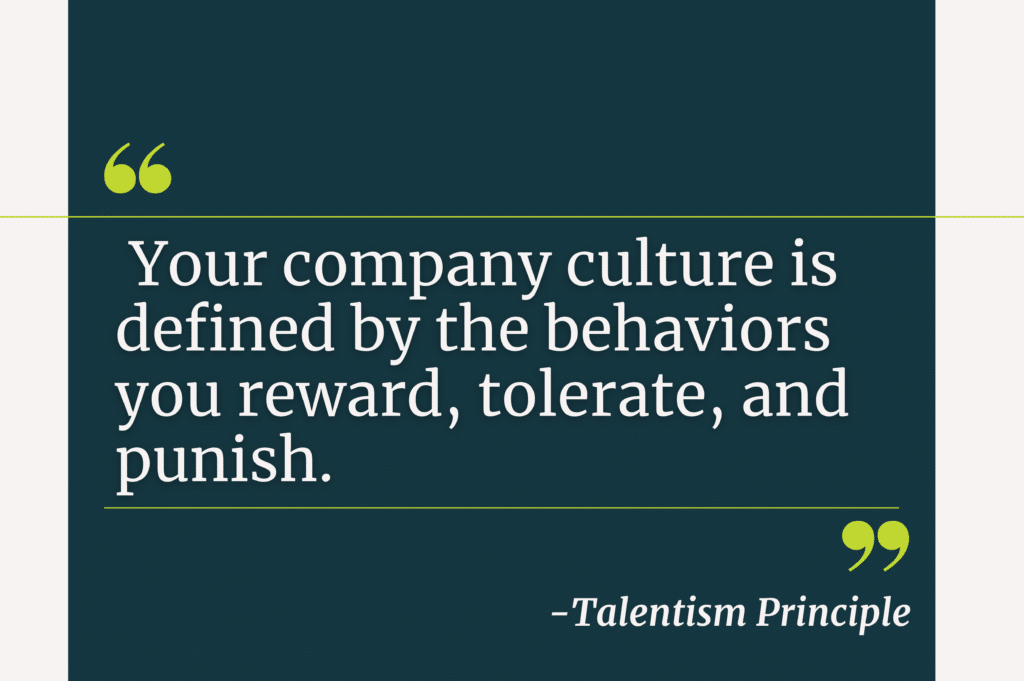I have worked in and for organizations that prioritize culture. They talk about it ceaselessly, spend millions codifying it, make it a priority in hiring and firing, and make consistently bold pronouncements about how culture eats strategy for breakfast. Culture is queen. I agree with them. They do this because they understand that culture is the cognitive operating system of the organization. It’s how people make decisions, form habits, and choose behaviors. It’s behind that crazy strategy to unseat the market incumbent, the office gossip, and everything in between.
I love culture, and I prioritize it at Talentism. My first adventure in culture-land was in 1989. I worked at the fastest-growing startup in history. The new president was from IBM, and he wanted a values statement. I eagerly agreed to participate in gathering information from all levels of the organization, carefully staging focus groups to narrow down our options, picking the best local printer to create awesome posters, and crafting the messaging for our global launch. Amazing.
It was a disaster. The values statements were a bust, and it hurt culture. Trust was diminished, executives were defensive, and I looked like a fool. People were scoring off the charts on cultural attributes in their performance reviews. But the place got meaner, more gossipy, and less fun to work at.
It took me many years to understand a fundamental truth about human beings: culture can either be a tool of protection or potential. If people don’t feel safe, culture documents are just playbooks for how to fake it so you can get management to go away. Even worse, they don’t even know they are doing it. It’s unconscious. Their attention may be on how to behave. But the rest of their brain, the vast portion that goes toward achieving unconscious goals, is figuring out how to go along while not getting killed.
Over the years, I have talked as many people out of culture work as into it. The CEOs aren’t self-aware enough to make it work. Even if they know that they can’t put the truth in a culture statement (e.g., “Power wins—if you don’t have it, only pleasing people who do will keep you safe”), they are afraid to let people know their dirty little secret. And even if they are sociopathic enough to not give a shit about whether the truth turns people off, they understand they have to live in the real world; people may suffer assholes, but they won’t sign up to work with one. Though they seem ready to vote for them and use their products without a second thought.
Culture is as culture does. I have worked on our culture statement at least three times a year for the last 10 years. I am sharing our most recent example below. It is a work in progress. I don’t yet have the self-awareness to be excellent at culture. I often don’t have the skill to see the path that gets me both a culture win and a business win, even though I know it is always there. The best I can do given my current state of personal mastery is to write it down, share it, and keep digging for everything I am missing. When I find it, I either get help to get better, or change the statement.
That’s the way I think culture should work. It doesn’t cost a lot of money. But it does take a lot of attention and humility.
–Jeff Hunter, Founder & CEO

We expect ourselves to reliably demonstrate compassion, commitment, courage, and curiosity.
We make this commitment even as we acknowledge it will often cost us dearly. We make this commitment to ourselves, our customers, our investors, our community, and each other. We understand that we will fail, and through that failing, learn. We expect mistakes to exist, but not to persist. In all cases, we learn and evolve.
Rather than define each term, we define the behaviors that are evidenced when our culture is working. We think of our commitment to ourselves and to others.
Compassion to self is care. To others, it is acceptance.
Commitment to self is learning. To others, it is delivering.
Courage to self is personal responsibility. To others, it is integrity.
Curiosity to self is self-awareness. To others, it is humility.
- Care – We attend to our health. We ask for help.
- Acceptance – We do not judge, but encourage. We do not support negative self- BSL narratives. We push to help others past fear and blindness.
- Learning – We relentlessly seek to unleash our productive potential. We look for ponies.
- Delivering – We sync expectations and exceed them. We stretch ourselves for the benefit of others.
- Personal Responsibility – We always, without exception, publicly own our feelings and outcomes. We never blame others.
- Integrity – We speak clearly and directly. If we believe it can help us or others, we share openly.
- Self-Awareness – We ceaselessly explore what we are like. We accept what we find. We constantly seek to be a better version of ourselves. We constantly experiment into our Big 4.
- Humility – We sync to understand before we are understood. We state ignorance without shame. We ask what we are missing. We strive to be without pretense or arrogance.
We believe that a commitment to these behaviors will enable us to systematically unleash our potential and the potential of people all around the world. We can be lucky, or we can be good. We choose to be great.



